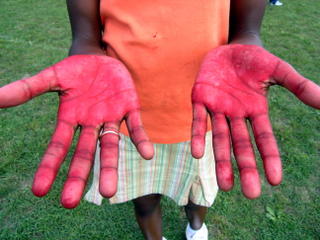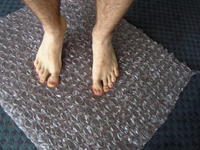After holding on to it for about two weeks, Patrick and I finally watched
Hotel Rwanda.
This comes at an interesting time. I have just been working on a Theory of Not Watching the News, which is sort of a spin-off of a satirical piece written by Leszek Kolakowski called, "The General Theory of Not-Gardening: A major contribution to social anthropology, ontology, moral philosophy, psychology, sociology, political theory, and many other fields of scientific investigation." The preface: "Those who hate gardening need a theory. Not to garden without a theory is a shallow, unworthy way of life. ... The alternative to not-gardening without a theory is to garden. However, it is much easier to have a theory than actually to garden."
Recently, my Theory of Not Watching the News (this includes news on the television as well as other media, such as print and internet news) was greatly enhanced by something I heard on the non-news radio, via the internet, in a piece from 2002 by Ira Glass, the host of the wonderful NPR show
This American Life. He was sharing some of his thoughts on journalism. What follows is a brief excerpt.
"... and I think unintentionally, because of the super-serious aesthetic of the news, it’s like all humor and surprise and pleasure and a sense of discovery are totally removed from the real news part of the newscast. And what that does is, this part of broadcasting which is pretending to capture the world, it’s like it’s saying, it's saying, this is a world, by accident almost--It describes a world where there is no pleasure, and surprise, and joy, and curiosity, most of the time."
Ira expresses so well the problem (or one of the principal problems, at least) that I have had with the news ever since I started trying to take it really seriously. Or maybe not, maybe he just provides me with the theoretical justification for my very real aversion for the news. The news makes the world look like a horrible place and makes me feel like I am powerless to make it better; I reject the notion that the world is horrible and that I have no agency to change it; I must not watch the news. Q.E.D.
Last night, Isabel was over, and I asked her what she'd been reading. She brought up her own sense of obligation to read the news, as an educated person and as a citizen in a democracy and so forth. Unrelatedly, we'd been talking about the Prisoner's Dilemma and various forms of it. It doesn't matter if you aren't familiar with this problem; the basic idea is that the people in it can choose to be either cooperators or defectors, and they each get a certain prize (fewer years in prison, or money, or whatever) depending not only on their own choice, but also on the choices of the others. Anyway, I was struck by Douglas Hofstadter's definition of defection: "A defection is an action such that, if everyone did it, things would clearly be worse (for everyone) than if everyone refrained from doing it, and yet which tempts everyone, since if only one individual (or a sufficiently small number) did it while others refrained, life would be sweeter for that individual (or select group)." Examples, given by Hofstadter: 1) Loudly wafting your music through the entire neighborhood; 2) Not worrying about speeding through a 4-way stop sign, figuring that the people going crosswise will stop anyway; 3) Not being concerned about driving a car everywhere, figuring that there's no point in making a sacrifice when other people will just continue to guzzle gas anyway; 4) Not devoting time or energy to pressing global issues such as the arms race [the book was published in the mid-80s], famine, pollution, diminishing resources, and so on, saying, "Oh, of course I'm very concerned--but there's nothing one person can do."
Excuse me for jumping around. I'm writing as I think, but I have faith that things will come together in some way by the end. I think the general idea at this point is that Not Watching the News, with a theory or without, makes me something of a defector. This may not be the general case, I haven't really thought about it, but in my case, I am quite aware that I don't watch the news because on some level, I accept that I can do nothing. So why bother. The news is always so upsetting.
Hotel Rwanda, if it should be classified as journalism, is not the kind Ira Glass described in my excerpt. The film does an excellent job of showing that even in the most terrible situations, when the gross majority of what is happening reflects humanity at its worst, there
is hope, dignity, surprise and even joy.
But still I feel powerless.
A purely hypothetical question: If one is truly powerless, is it less moral to choose to be blind to injustices and atrocities than to face them?
Forget about that, because the question is hypothetical and as such, relatively useless. I respond to myself: No one is ever truly powerless. Least of all you.
In the short term, I am. I am convinced that nothing I could have done would have altered any detail of what happened and happens in Rwanda, Sudan, Iraq, or Washington. And yet ... apathy breeds apathy. Those who would make a positive difference in this world need support, not just money and signatures but emotional support, because the work is hard. We, I have to get over the feeling that I will always lose on every issue and focus instead on building a culture of support. If it didn't make me feel like a self-help book, I would remark that feeling powerful is being powerful.
If I'm not convinced of that, I at least believe this: feeling powerless is being powerless. It's empirically proven. And hermetically sealed. (What does that even mean?? Why is it printed on my tea bags?? -Don't try to answer that)
But "building a culture of support" or whatever I just said sounds
lame in the face of genocide.
So I still feel totally conflicted. Powerful, or powerless? To watch the news, or not to watch the news? To cooperate, or to defect? Powerful, or ? ... And when is enough enough??
Holla back, y'all.
 So first of all, how is school? Yesterday was fantastic, today dragged. The funny thing is, I changed my plans for yesterday (the first day of school) at almost the last minute, while my plans for today had been sitting around for weeks. Anyway, we've discussed What It Takes To Be Good At Math, which was amazing--out of 25 groups of four (100 students), only one group shared something like "knowing your basic skills and being able to do problems fast." Most groups said things like "work hard," "listen," "work as a team," "determination," "patience," and my favorite: "Don't be embarrassed when you don't know stuff. Ask questions." Wow! I'm looking forward to referring to that for the rest of the year. Another big thing I'll get to pull on is group roles. I'm using Team Captain, Facilitator, Recorder/Reporter, and Resource Manager, and I got the whole middle school (six or seven teachers) on board! The other teachers are great, and I can already tell that they're doing fantastic things to make these roles really useful across our classes.
So first of all, how is school? Yesterday was fantastic, today dragged. The funny thing is, I changed my plans for yesterday (the first day of school) at almost the last minute, while my plans for today had been sitting around for weeks. Anyway, we've discussed What It Takes To Be Good At Math, which was amazing--out of 25 groups of four (100 students), only one group shared something like "knowing your basic skills and being able to do problems fast." Most groups said things like "work hard," "listen," "work as a team," "determination," "patience," and my favorite: "Don't be embarrassed when you don't know stuff. Ask questions." Wow! I'm looking forward to referring to that for the rest of the year. Another big thing I'll get to pull on is group roles. I'm using Team Captain, Facilitator, Recorder/Reporter, and Resource Manager, and I got the whole middle school (six or seven teachers) on board! The other teachers are great, and I can already tell that they're doing fantastic things to make these roles really useful across our classes. Here's a photo of Chinatown, where Patrick and I went last Sunday. Picked up some cheap slippers, a cute jar with a panda climbing into it to put my pens in, and some groceries. And lucky bamboo, which Patrick loves and which doesn't need much sun. Had a huge lunch, too. I discovered that the cold thing I love, the round slices made of soy sheets with mushrooms in the middle, that's the only vegetarian part of the dish with the jellyfish and the ham and stuff, is called "Vegetarian Shanghai Chicken." Strange.
Here's a photo of Chinatown, where Patrick and I went last Sunday. Picked up some cheap slippers, a cute jar with a panda climbing into it to put my pens in, and some groceries. And lucky bamboo, which Patrick loves and which doesn't need much sun. Had a huge lunch, too. I discovered that the cold thing I love, the round slices made of soy sheets with mushrooms in the middle, that's the only vegetarian part of the dish with the jellyfish and the ham and stuff, is called "Vegetarian Shanghai Chicken." Strange.






